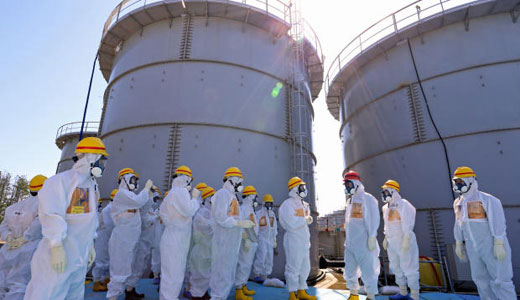
As fresh horrors in the global Fukushima disaster continue to unfold, workers are the latest victims. Six of them, who were working at the plant, were accidentally splashed with highly irradiated water this week while accidentally removing the wrong pipe from some equipment. The incident is the newest in a laundry list of dilemmas connected with the plant. The other main issue – the continued seepage of toxic water into the Pacific Ocean – is ongoing.
Yoshimi Hitosugi, spokesman for the Tokyo Electric Power Company (TEPCO), said the radioactive water spilled onto the workers and the entire floor of the facility in which they were working. The area in which the incident occurred houses three units that are used for the treatment of water in the plant.
TEPCO has recently come under fire for allegedly misleading the public about safety levels and oversight at the Fukushima plant. The latest controversy has been the company’s apparent failure to publicly acknowledge the full scope of the leakage of irradiated water into the sea.
Though the workers were wearing face masks and hazmat suits, their exposure to radiation is still cause for concern. It will undoubtedly continue to shake the confidence of the Japanese people in TEPCO’s ability to get the Fukushima chaos under control.
The workers’ operations were rather routine. In order to keep the melted reactors cool, they must continuously be doused with water, which then becomes contaminated and must be periodically pumped out and stored in tanks. It was during this basic maintenance that the workers were put at risk.
Shunichi Tanaka, chairman of Japan’s Nuclear Regulation Authority, downplayed the hazard, saying, “It was serious in that it was a problem caused by carelessness, but I do not believe they were exposed to a seriously troubling dosage” of radiation.
The pipe was later reconnected and the water was contained and cleaned up. But concerns remain. Many believe, for example, that workers helping with cleanups are being unnecessarily exposed to radiation.
One such person is 73-year-old retired steel industry engineer Yusuteru Yamada. He suggested that having young workers participate in the cleanup is unwise. “I’m 73 and on average I probably have 13 to 15 years left to live,” he said. “Even if I were exposed to radiation, cancer could take 20 to 30 years or longer to develop. Therefore us older ones have less chance of getting cancer.” He said that over 200 retirees have offered their skills, and have much to contribute. “The Fukushima site should be a national project independent from TEPCO,” he added. “Such a job can’t be handled by a profit-oriented company.”
Furthermore, according to Tanaka, the morale of younger workers is low simply due to the extent of the disaster. “Careless mistakes are often linked to declining morale,” he said. “People usually don’t make silly, careless mistakes when working in a positive, healthy environment. The lack of [focus], I think, may be related to the recent problems.”
Photo: Workers are briefed about tanks containing radioactive water. Many of these workers, some feel, are unnecessarily exposed to radiation. AP












Comments